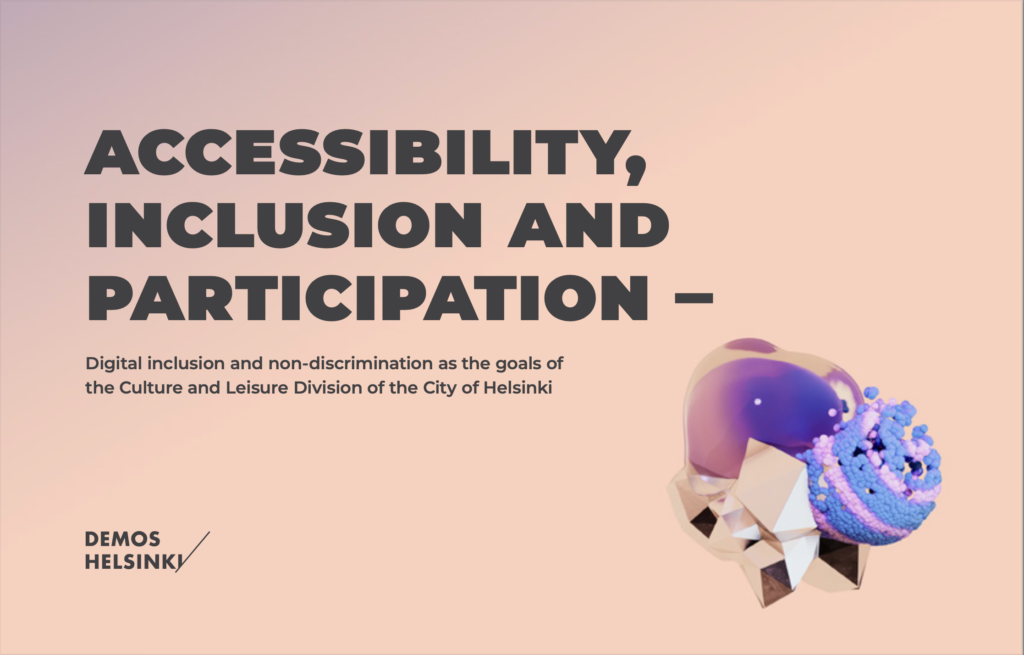The vocabulary related to equality is partly overlapping and in public debate different terms are sometimes used interchangeably. The publication, created in a project with the Culture and Leisure division of the City of Helsinki, has made a distinction between "accessibility", "inclusion", and "participation" in terms of digital equality.
Digital inclusion and equality as the goals of the Culture and Leisure Division of the City of Helsinki
“Digital skills are the new civic skills!”
“Almost a million Finns have weak digital skills!”
These headlines show that digital inclusion speaks volumes in Finland. Demos Helsinki deepened the understanding of what the prevention of digital exclusion and easy access to digital services mean with the Culture and Leisure division of the City of Helsinki.
The vocabulary related to equality is partly overlapping and in public debate different terms are sometimes used interchangeably. The publication, created in a project with the Culture and Leisure division of the City of Helsinki, has made a distinction between accessibility, inclusion and participation in terms of digital equality.
Accessibility is defined as the accessibility of digital services: the minimum level that makes a website or service available to all network users. A directive obliges public actors to consider accessibility and assess it using the WCAG (Web Content Accessibility Guidelines) standard.
Inclusiveness, that is, inclusion or changing unequal structures, on the other hand, also requires conscious action. When considering new projects to promote digitalisation, one should always think about how to ensure that users actually find an accessible service or tool. Digital inclusion is a consideration of real inclusion, not just the absence of barriers. As one of the project workshop participants summed up: “Inclusiveness is also a value issue. That what is sent to develop and what is not.”
Participation, on the other hand, is a sense of belonging and the opportunity to influence. Achieving it requires accessibility and inclusion for as many people as possible, and guaranteeing it requires commitment and work from the community or organizations, but also benefits itself when a larger group feels they can work for the common good. To this, digitalisation provides new tools, such as the beginning of participatory budgeting.
The elderly not the only group at risk of being left out
The main message of the publication is that digitalisation is a tremendous opportunity for inclusion and participation. Cultural and leisure services have a special role to play in promoting opportunities. Not all services require strong authentication, libraries are an important place for digital peer learning, and cultural experiences can now even be taken home.
At the same time, digitalisation creates challenges for equal participation. Social inclusion also includes those who will never use digital services and tools to even do the basics. Last year, just over half of those aged 75–89 had never used the Internet (Official Statistics of Finland 2018).
“Inclusion is also a matter of values – what is sent to develop and what is not.”
Today’s older people are not the only group that is at risk of being left out of the opportunities offered by digitalisation, but people and groups are moving from the core of the digital services user group to the risk of digital exclusion in their lifetime. Therefore, a commitment to accessibility and inclusion benefits us all. Technology is constantly evolving and the city’s services need to keep up with this development. At the same time, we need to consider how to ensure that as many people as possible have access to the opportunities offered by digitalisation.
During the spring and autumn of 2019, the project interviewed 14 experts from organizations and the city’s equality and service planning, as well as five Helsinki residents belonging to different user groups of digital services. In addition, two expert workshops were held to identify challenges and to develop ideas together.
Further information: Johannes Anttila, johannes.anttila@demoshelsinki.fi, +358 44 535 1152


What is the Collingridge dilemma and why is it important for tech policy?
Post
February 15, 2022
An assessment framework for non-discriminatory AI
Publication
August 23, 2022
100 Million New Jobs: New Promise of Freedom for a Successful EU
Publication
March 7, 2019